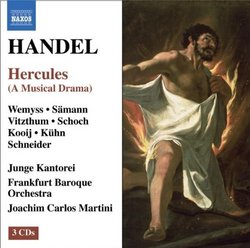| All Artists: Wemyss, Samann, Vitzhum Title: Handel: Hercules Members Wishing: 1 Total Copies: 0 Label: Naxos Original Release Date: 1/1/2008 Re-Release Date: 5/27/2008 Genre: Classical Styles: Opera & Classical Vocal, Historical Periods, Baroque (c.1600-1750), Symphonies Number of Discs: 3 SwapaCD Credits: 3 UPC: 747313296026 |
Search - Wemyss, Samann, Vitzhum :: Handel: Hercules
CD Details |
CD ReviewsHERCULES complete at last, and very well performed Nicholas A. Deutsch | New York, NY USA | 09/19/2008 (4 out of 5 stars) "Handel's "Musical Drama" HERCULES (1744) is one of a pair of secular dramas on Greek myths - the other is SEMELE - which the composer wrote for concert performance after he had shifted his energies from Italian opera to English oratorio. A dark drama of the destructive power of jealousy, it boasts a score of great power, of which Dejanira's scene of madness and remorse "Where Shall I Fly?" has become a favorite of mezzo-sopranos.
Yet oddly, until this Naxos recording there has never been a note-complete HERCULES on disc. John Eliot Gardiner's strongly cast 1983 version cuts 8 entire nymbers and parts of other as well; Marc Minkowski's highly praised version (2000) uses a somewhat fuller text, but inexplicably shifts a couple of numbers around to no great purpose - a willful misrepresentation of Handel's intentions. Here at last we have everything complete and in the right order, giving us the text that Handel apparently first planned to perform, including a short stretch of recitative in Act II which he crossed out in his autograph score (although it was printed in the published libretto). We even get a short (2:11) number for soprano and chorus from his (unperformed) incidental music for ALCESTE, "Still caressing and caress'd," which he interpolated in a revival of HERCULES - a charming piece that can easily be programmed out. And the good news is that - somewhat to my surprise - this is a really fine performance, and well recorded. This series of big Handel vocal works under Joachim Carlos Martini on Naxos has been uneven, to put it as politely as possible. To be honest, after a couple of disappointing issues my interest dropped off drastically. But this live performance is very good, in some respects excellent. While it can't always match the highly polished Minkowski and Gardiner versions, it also avoids their occasional self-consciousness: this is pleasingly direct and expressive Handel, whatever the passing flaws. Which to my ears are: occasional verbal slips (insignificant), a somewhat backward and boomy acoustic for the chorus - in contrast to the close and well-defined orchestra and soloist image - and a very few musical rough spots. Also, I'm not fond of the use of organ in recitatives and in solo arias, but at least here it's pretty discreetly done. Otherwise, this is a well-conducted and sung HERCULES, one which is also dramatically intense. The team of soloists is strong: Soprano Gerlinde Samann is an ideal Iole, lovely of voice and expression, maybe the best on disc (she even makes something of her weakest aria "Banish love from thy breast"); Scottish mezzo Nicola Wemyss delivers a strongly characterized Dejanira, her attractive vocal delivery marred very slightly by a bit of "rust" in low notes (indisposition?); Countertenor Franz Vitzthum is a scrupulous soprano-ish Lichas, very adept in coloratura, his straightforward delivery to my ears preferable to David Daniels's overdone performance for Minkowski; Tenor Knut Schoch an appealing, virile Hyllus; and bass Peter Kooij, somewhat dry of voice but stylish as both Hercules and the Priest of Jupiter. Apart from Samann, one might prefer this or that soloist on another recording; but this performance is far more than the sum of its individual parts, a real achievement, and I recommend it as first choice for anyone new to HERCULES. After that, you may want to hear Minkowski or Gardiner, and definitely get "Lorraine at Emmanuel," which centers on the late Lorraine Hunt Lieberson's performance as Dejanira. The video version with Joyce DiDonato preserves a stage production that turns the characters and action of the piece upside-down in a horribly cynical fashion. Synopsis and program note, no libretto - but this can be downloaded from the Naxos website. " |

